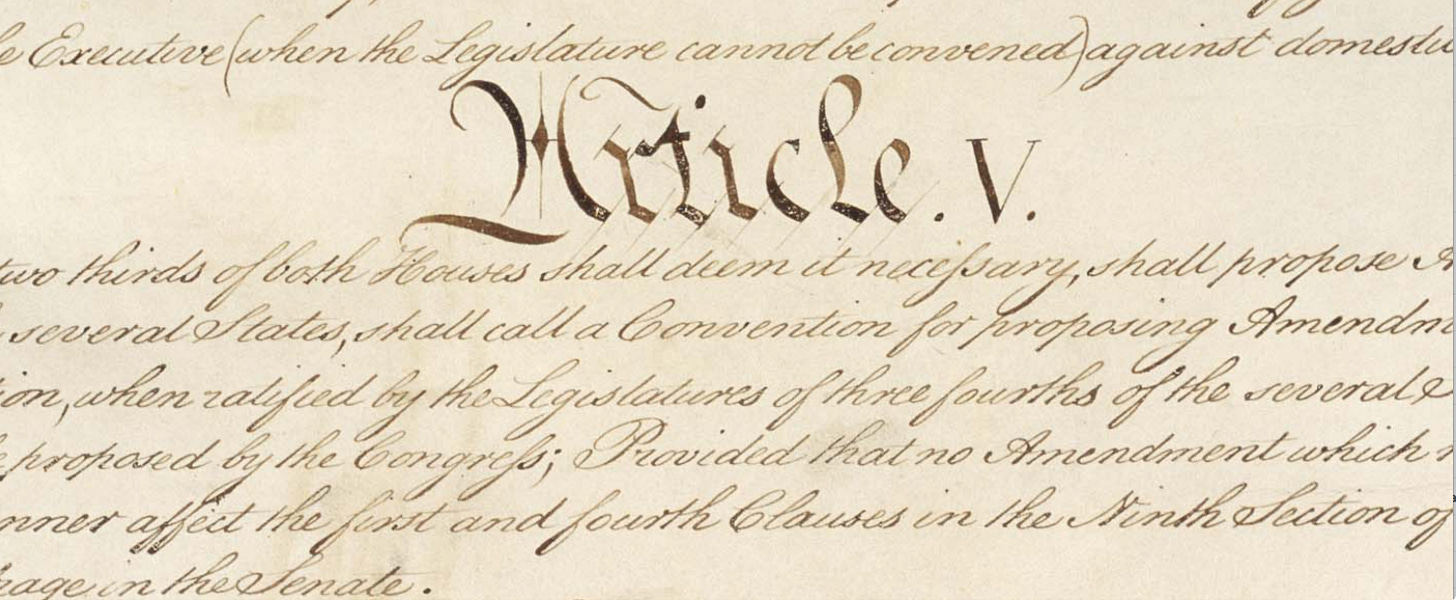We Have to Clean Up the Mess Ourselves
As the US slides toward $40 trillion in debt, we have very little time to act. And by "we" I mean We the People acting through our state legislatures to invoke Article V.
The time has come to confront the stark reality: US federal debt is not just an abstract number on a ledger.
It is a ticking time bomb.
Currently, US debt stands at almost $36 trillion. This red-ink ocean threatens to sink the federal government and drown our economy. If we don't act now, our children will be handed the bill and a dirty mop.
There is no end in sight when it comes to federal spending. The interest payments on this debt now exceed our already grotesque military budget. Neither party seems interested in meaningful reform. Presidential candidates are too busy discussing Ohio cat cuisine and growing up in the middle class unburdened by what has been.
Short-term political incentives leave us vulnerable to adversaries such as China, who patiently await our insolvency. Ironically, as the managerial-military state expands, we are sino-forming ourselves as we slide toward authoritarianism. This threatens our rights and freedoms and permits powerful authorities to operate outside the law, especially the Constitution.
To repeat: though this is the most threatening crisis of our age, neither political party nor candidate is talking about it.
So, we have to clean up the mess.
We have a tool at our disposal that has been used repeatedly over the last four centuries. Our Constitution gives us the means to take action. This approach has a proven track record, but it’s the last stop on the disaster train. With over 650 successful operations recorded in our history—the most recent occurring in 2017—we can do it again.
What We Must Do
Article V of the U.S. Constitution provides two methods for proposing amendments. Amendments can be proposed by a two-thirds majority vote in the House of Representatives and the Senate or by a convention called for by two-thirds of the state legislatures. Once an amendment is proposed, it must be ratified by three-quarters (38 out of 50) of the state legislatures or by conventions held in three-quarters of the states, depending on the method of ratification chosen by Congress.
Our power lies in the states-based solution.
The proposal would revise the current rules governing congressional appropriations. Under the proposed changes, Congress would be restricted to setting a budget for the upcoming period that does not exceed the previous year's spending limit, which would also be capped at a constitutionally mandated percentage of the previous period's GDP. The proposal could also include the introduction of standardized accounting principles, which are currently absent. Deviations would have specified time limits and would include penalties for members of Congress who abuse their fiscal authority or fail to comply.
Some have proposed a provision allowing budget deviations in response to unforeseen circumstances, such as wars, famines, or pandemics. But this would be a grave mistake because it would create incentives for the powerful to declare a perpetual state of emergency—wars, famines, and pandemics, some of which have already been demonstrated. (I’ll pass over the dubious origins of COVID-19 but remind readers that the war in Afghanistan lasted twenty years.)
Last Chance Before Collapse
It is time to harness this more muscular assertion of states’ rights. Since the founding of America, ultimate authority has been vested in the people, or so the story goes. Now is the time to stand up, speak up, show up, and take that power. We must claim our authority to act where the federal government has failed.
If we do not, collapse looms.
The only other option is acceleration—throwing our hands up and welcoming the coming disaster. That might work if it were possible to develop an order free of the parasitic and predatory classes. But they’ll be there waiting with the Cloward-Piven playbook in hand.
Consider that in 1984, New Zealand avoided an economic catastrophe through austerity and economic liberalization. Today, New Zealand is one of the freest and wealthiest countries in the world, with a per capita GDP of $50,000 and a debt-to-GDP of only 30 percent compared to 130 percent for the US.
If they can do it, we can, too.
If an Article V effort fails, we must prepare to struggle for a different socio-political order—the sort I have proposed in these pages many times. In other words, this is our last chance to employ Constitutional means to rescue the republic. It might be a fool’s errand because it depends on politicians, but at least politicians in our state legislatures are on a tighter leash than those in Congress.
Today, incentives in all the usual avenues work against federal reform. Still, through the strength of our states, it might be possible to pull the federal government back from the precipice.
This is our last chance.





Too late. Secession, and the concomitant abolition of the so-called union, is the only hope.
No successful socialist system has been implemented. Destruction of the state is necessary but not its replacement.